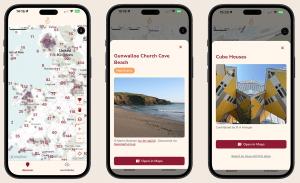1 Million Beautiful Places: harnessing AI and community to create unprecedented data on what makes places beautiful
Communities and AI map 1 million beautiful places globally, democratising beauty by celebrating everything from famous sites to overlooked neighbourhood spots.
Chanuki explains: “We intuitively grasp the profound influence of beautiful places. They enhance our personal joy, solidify community bonds, and act as catalysts for economic prosperity. However, their quantifiable value remains elusive. Beautiful Places AI bridges this gap, delivering vital data to empower initiatives that help safeguard and create more beauty in the world. We want to integrate the beauty of the world into our daily lives, because we believe that beauty is a human necessity, not a luxury.”
The 1 Million Beautiful Places project uses crowdsourced data and cutting-edge AI, including multimodal LLMs, to rapidly identify and map beautiful places from both existing image archives and user contributions - the technological breakthrough that makes cataloguing one million places possible for the first time. As a non-profit Community Interest Company, Beautiful Places AI is treating data on the beauty of places as critical infrastructure that's been notably absent from economic and policy decisions. They have already successfully mapped over 90% of the UK and Ireland thanks to Geograph.org.uk sharing their repository of 8 million images. With the help of early testers, beautiful places from all around the world, including Japan, Singapore, France, the Netherlands, Morocco and Australia, are already included.
The data could inform everything from conservation priorities to urban regeneration projects, providing evidence where previously there were only assumptions.
The democratic approach, combining AI with the wisdom of tens of thousands of individuals, means beauty isn't defined by traditional gatekeepers but by collective human insight - encompassing everything from celebrated landscapes to overlooked local gems, from urban pocket parks to rural landscapes. Contributors range from amateur photographers finding beauty in everyday corners to weekend explorers documenting hidden spaces, united by their belief that beauty in our surroundings should be a universal right, not a privilege for the few.
The background to Beautiful Places AI
Beautiful Places AI evolved from PhD research conducted by Chanuki at the University of Warwick and the Alan Turing Institute exploring the connection between beautiful places and wellbeing. These were the first studies to be conducted across an entire country and showed that more beautiful areas are linked to reports of better health and increased happiness. Moreover, these results held true even in urban areas once factors such as income were taken into account.
The research was followed by a paper published in Royal Society Open Science in 2017 examining the makeup of beautiful places and how online data combined with deep learning algorithms can provide a deeper understanding of which environments we find beautiful. The research also discovered that deep learning algorithms can accurately predict the beauty of outdoor scenes.
Chanuki then teamed up with Dr. Stephen Law at the Alan Turing Institute to investigate which built-up elements might lead to more beauty. Working alongside Chanuki and Stephen on Beautiful Places AI is Cleo Valentine, a neurophysiology specialist and a University of Cambridge researcher working on architectural neuroimmunology - examining how built environments influence neurophysiological stress and immune function.
Stephen comments: “The data being collected by Beautiful Places AI can be used to understand the impact of beautiful places on human and economic wellbeing. Armed with quantitative evidence, public good organisations and local communities can make more informed decisions about the creation and conservation of beauty in their neighbourhoods. Finally, we will be in a position to understand how to design our cities to be more beautiful and liveable spaces."
Chanuki Illushka Seresinhe
Beautiful Places AI Community Interest Company
chanuki@beautifulplaces.ai
Visit us on social media:
LinkedIn
Instagram
Beautiful Places AI App to map 1 Million Beautiful Places Globally
Legal Disclaimer:
EIN Presswire provides this news content "as is" without warranty of any kind. We do not accept any responsibility or liability for the accuracy, content, images, videos, licenses, completeness, legality, or reliability of the information contained in this article. If you have any complaints or copyright issues related to this article, kindly contact the author above.

